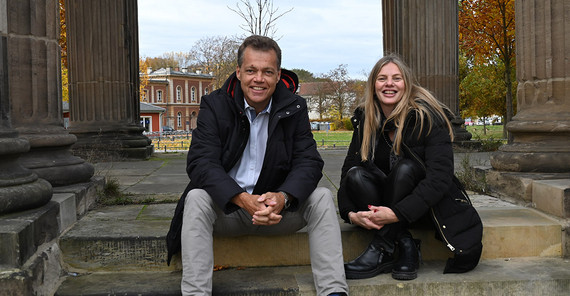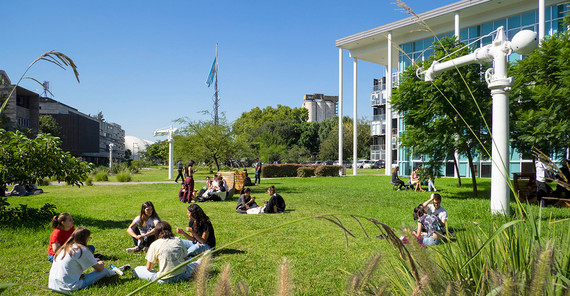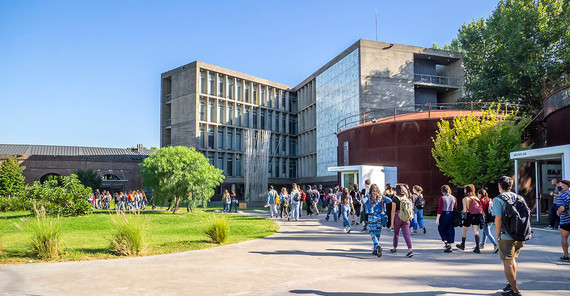You are both liaison officers for the University of Potsdam – Lili Mayer in Argentina, Sven Dinklage in Brazil. What does this mean?
Sven Dinklage: We are like an extension of the University of Potsdam in South America and establish connections – with local universities, students, and researchers.
Liliana Mayer: We work for the benefit of both sides: We help students who want to find a suitable university for a semester abroad or an internship, researchers who want to establish contacts with suitable working groups on the other side of the Atlantic. Many people we have helped go on to become ambassadors of exchange themselves. There are currently four students from Argentina in Potsdam. What I hear from them is positive through and through. They will take this feeling home with them and inspire others!
What does everyday life as a “bridge builder” look like?
Dinklage: We are like ambassadors – and make an effort to present the University of Potsdam in our countries. We do this online, for example on social media, in local media, and of course directly on site – be it alone or together with other German institutions and universities, the German Academic Exchange Service (DAAD), or the Goethe Institute. We want to make people in Brazil and Argentina curious about Potsdam.
Mayer: As Sven says, there are many ways to do this. For example, we are out and about at trade fairs or in schools, where university and school students can find out about study opportunities. We get talking to them and tell them about Potsdam. Many of them then contact us for advice. Some already have very specific ideas and ask about Potsdam, others hardly know anything about Germany.
Dinklage: Our Zoom office hours are a very successful tool that was created during the pandemic. Once a month, we provide information about opportunities for stays abroad and research collaborations – and each time we invite a guest to talk about their experiences in Potsdam.
Mayer: I recently held my online office hours for the first time. A student used this opportunity to talk about how she went to Germany without any previous experience or contacts and had a great time. This is rather rare, but was proof that it works and is easier than many people think.
How do you help students from Potsdam who want to go to South America?
Dinklage: We usually only come into contact with Potsdam students later in the process, when they have already decided on a stay in Brazil or Argentina. When deciding where they want to go and taking their first steps, they receive excellent support from the International Office of the University of Potsdam. Of course, we then help them here on site if there are any problems.
Mayer: We are also always exploring new opportunities for internships, for example. We now have numerous agreements with a wide variety of institutions. In addition, there are collaborations with schools where student teachers regularly complete a teaching internship. In any case, anyone who wants to know more in advance can contact us directly!
And what about researchers?
Dinklage: Bringing together researchers who have similar interests and whose scientific work would benefit from cooperation is challenging and a long-term undertaking – but it is like the pinnacle of our work. Last year, for example, the Liaison Office Brazil was able to support the business informatics specialist Prof. Norbert Gronau and the didactics of German specialist Prof. Winnie-Karen Giera in initiating new projects with the long-standing partner universities São Paulo (USP) and Campinas (Unicamp). Of course, there are also researchers who are already familiar with the country and have established contacts with specialists by themselves, such as the research cooperation between hydrologist Prof. Axel Bronstert and the UFC Fortaleza, as well as projects at the UFMG Belo Horizonte in the field of English linguistics.
How did you get this rather extraordinary side job?
Dinklage: It really is an unusual job. But also a real privilege – there are few people who get the opportunity to represent a German institution abroad. How I got there, is not in a straightforward way either: A good ten years ago, I was asked to show a German tour group, a delegation from the University of Potsdam, around a coffee plantation. Dr. Regina Neum-Flux, the head of the International Office, was also there and approached me afterwards to ask if I could imagine becoming a liaison officer for the University of Potsdam in Brazil. I didn't have to think about it for long.
Mayer: I've only been doing this for a year. My predecessor recommended me and since I have been familiar with the Argentinian world of research and academia for some time, I simply applied for it. I am very pleased that it worked out.
What do you do when you are not representing the University of Potsdam?
Mayer: I work at the University of Buenos Aires, doing educational research as a sociologist.
Dinklage: I have had a consultancy firm in the field of management coaching for some time. Intercultural issues are among my focus areas. I have found that this fits perfectly with my role as a bridge builder in research and academia.
What brought you both to South America?
Dinklage: A thirst for adventure! I spent some time in the US while I was still at school and part of my studies were spent in Paris. After that, I really wanted a job abroad and went to Brazil for Robert Bosch GmbH, where I had already completed an internship. I married a Brazilian woman whose grandfather had immigrated from Germany in the 1930s. Incidentally, our son is studying at Unicamp, one of our partner universities, and is currently completing a four-month research internship in the US.
Mayer: I was born and raised in Buenos Aires, so I have been there almost all my life. But I actually have some links to Germany: My family is from here – and I myself spent some time at Freie Universität Berlin.
Time for a bit of advertising: What can UP members expect when they come to South America?
Dinklage: South America has so much to offer: The scientific landscape, especially at the partner universities, is great! A lot is happening here in various areas that are also important at the University of Potsdam: geosciences, biology, hydrology, but also Romance studies and educational research. That is the technical side, the research. Otherwise, you can look forward to an absolutely unique experience! The societies of our countries are extremely dynamic. I always say: A three-month stay in South America is the equivalent of two years at home!
Mayer: The great thing about coming here: It is different. Definitely challenging, but that makes it worthwhile. I would advise everyone not to take the easy way out and do a semester abroad “just around the corner.” I also took a big step with my time in Berlin and have grown a lot from it. Students who come to Brazil or Argentina experience a completely different world to the one they know – and that's what life is all about! We help them so that they can enjoy this step.
--------------------------
Argentina has been a focus country of the University of Potsdam's internationalization strategy since 2015. The UP research focus "Earth and Environmental Sciences," which has maintained close links with Argentina in research and teaching for many years, is particularly active. Since 2012, the department has been working with universities in Buenos Aires (UBA), Salta (UNsa), Jujuy (UNJu), and Tucuman (UNT) on a joint training and mobility program for students and doctoral candidates.
Liliana Mayer, Liaison Officer of the University of Potsdam in Argentina and Uruguay
liliana.mayeruuni-potsdampde
Brazil has been a focus country of the University of Potsdam's internationalization strategy since 2015. At the moment, the primary goal of Potsdam's involvement in Brazil is cooperation in the training of doctoral students, particularly in Romance studies. There are also joint projects in linguistics, political science, and geosciences.
To achieve its strategic goals, the UP maintains a liaison office in São Paulo. The UP is also one of the main supporters of the German Center for Research and Innovation (DWIH) São Paulo and benefits from the DWIH's network structures.
Sven Dinklage, Liaison-Officer of the University of Potsdam in Brazil
dinklageuuni-potsdampde
This text was published (in german language) in the university magazine Portal - Eins 2024 „Welt retten“ (PDF).



